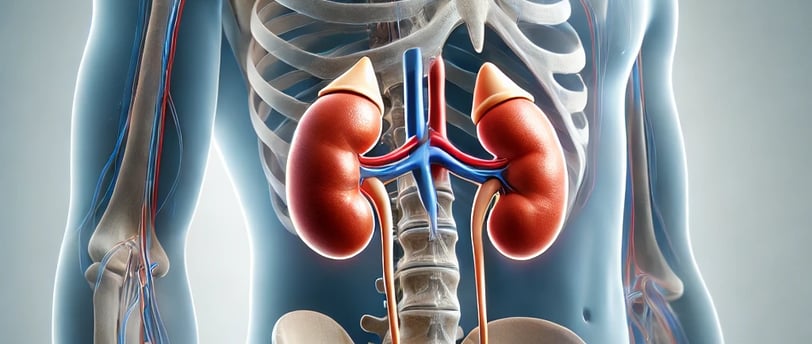Uremic Syndrome: The Silent Saboteur of Your Health
Uremic syndrome, a severe complication of kidney dysfunction, is often overlooked until it becomes life-threatening. This article delves into the essential facts about uremic syndrome, shedding light on its causes, symptoms, diagnosis, and treatment. Let’s explore how this condition can quietly disrupt your health and what you can do to manage it effectively.
NEPHROLOGY
Rishwin A R
1/19/20252 min read


What is Uremic Syndrome?
Uremic syndrome is a clinical condition that arises when kidney function declines, leading to the accumulation of waste products in the blood. This toxic buildup impacts multiple organs, causing a variety of symptoms and complications.
Causes of Uremic Syndrome
Uremic syndrome is typically caused by:
Chronic Kidney Disease (CKD): The leading cause, where progressive kidney damage results in decreased filtration ability.
Acute Kidney Injury (AKI): A sudden loss of kidney function due to conditions like severe dehydration or sepsis.
Obstructions in the Urinary Tract: Blockages that prevent waste elimination.
Polycystic Kidney Disease: A genetic condition causing cysts in the kidneys.
Symptoms of Uremic Syndrome
The symptoms of uremic syndrome vary but may include:
General Symptoms:
Fatigue and weakness
Loss of appetite and nausea
Metallic taste in the mouth
Itchy skin
Neurological Symptoms:
Confusion or difficulty concentrating
Seizures (in severe cases)
Cardiovascular Symptoms:
High blood pressure
Chest pain
Irregular heartbeat
How is Uremic Syndrome Diagnosed?
Key Diagnostic Tools:
Blood Tests: To measure creatinine, urea, and electrolyte levels.
Urine Tests: To detect protein, blood, or abnormalities in urine.
Imaging Studies: Ultrasound or CT scans to identify structural issues in the kidneys.
Kidney Biopsy: In certain cases, a biopsy may be performed to determine the exact cause of kidney dysfunction.
Treatment Options for Uremic Syndrome
Treating uremic syndrome involves addressing the underlying cause and managing symptoms.
Medical Interventions:
Dialysis: Removes waste products and excess fluid from the blood.
Medications: Includes antihypertensives, erythropoietin for anemia, and phosphate binders.
Dietary Changes: A low-protein, low-sodium diet can reduce kidney stress.
Kidney Transplant: For end-stage kidney disease, a transplant may be the best option.
Supportive Therapies:
Managing fluid intake
Treating infections promptly
Regular monitoring of kidney function
Preventing Uremic Syndrome
Prevention revolves around protecting kidney health. Here are actionable tips:
Control Blood Pressure: High blood pressure is a significant risk factor.
Manage Diabetes: Keep blood sugar levels in check to prevent kidney damage.
Stay Hydrated: Proper hydration supports kidney function.
Limit NSAIDs: Overuse of nonsteroidal anti-inflammatory drugs can harm the kidneys.
Regular Health Checkups: Early detection of kidney issues can prevent progression.
Conclusion
Uremic syndrome is a serious condition, but early detection and proper management can make a significant difference. Protecting your kidneys through lifestyle choices and regular checkups is crucial. If you or a loved one experience symptoms, consult a healthcare provider promptly.
Frequently Asked Questions (FAQs)
1. Can uremic syndrome be reversed?
In early stages, managing the underlying cause can reverse the symptoms. In advanced stages, dialysis or a kidney transplant may be required.
2. Is uremic syndrome life-threatening?
Without treatment, it can lead to severe complications, including heart failure and neurological issues.
3. What dietary changes help with uremic syndrome?
A kidney-friendly diet low in protein, sodium, and phosphorus is beneficial. Consult a dietitian for personalized guidance.
4. Who is at risk for uremic syndrome?
People with chronic kidney disease, diabetes, high blood pressure, or a family history of kidney issues are at higher risk.
5. How often should kidney function be monitored?
Individuals at risk should have kidney function tests at least once a year or as recommended by their healthcare provider.
Syndromes.xyz
Explore medical syndromes and their details here.
For Educational purposes only
The information on this site is not in any way, replacement for professional advice. Always consult your physician regarding personal queries
Connect
Support
syndromesxyz@gmail.com
© 2024. All rights reserved.
